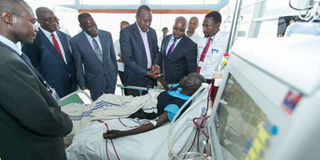Allow referral hospitals to be autonomous

President Uhuru Kenyatta commissions Kisii Teaching and Referral Hospital in Kisii Town. PHOTO | PSCU
What you need to know:
- All levels of government have this onerous responsibility to ensure that all citizens of this country have access to the highest attainable standard of health care services.
- The framers of our constitution envisaged two levels of health service delivery in tandem with the devolved structures.
- The national health system was envisaged as the repository and source of national health policy that would guide both levels of government on health service delivery.
- The county health system was meant to provide health services right from the community level to the level of county hospitals.
At the Kenya Medical Association annual scientific conference in Kisumu a week ago, senior medical doctors, including professors George Magoha and Richard Muga, asked the national and county governments to find a way of converting referral hospitals independently.
They suggested that these facilities, which occupy the same level as the former provincial general hospitals, should be converted into state corporations with their own budget lines and independent management teams under the supervision of the national government.
Many county government leaders will view this proposal through the same blinkers that have blinded them over the past three or four years, as another instance of health workers seeking to subvert devolution.
The national government might, on the other hand, chalk it down as one more victory over purportedly “rogue” county governments.
Unfortunately both these views are misguided and only end up hurting the poor majority.
As we have argued before, a government that cannot address the health challenges of its population has no moral authority to govern, and needs to be replaced posthaste.
All levels of government have this onerous responsibility to ensure that all citizens of this country have access to the highest attainable standard of health care services. Additionally, at each level of government, all arms of government share this responsibility as clearly articulated in the constitution.
The truth of the matter is that the framers of our constitution envisaged two levels of health service delivery in tandem with the devolved structures. There was meant to be a national health system and a county health system, each with clear responsibilities and mandates.
The national health system was envisaged as the repository and source of national health policy that would guide both levels of government on health service delivery. In addition, this system would run the referral hospitals whose catchment areas went beyond county boundaries.
PREVENTION OF DISEASE
The county health system, on the other hand, was meant to provide health services right from the community level to the level of county hospitals. The main focus was to be on health promotion and prevention of disease, as well as provision of primary health care services.
County hospitals would be designed to deal with common health problems in the county, and more complicated cases requiring very specialised services would be referred to the national referral facilities. One would expect that there would be dozens of national referral facilities across the country, in order to ensure that all citizens have access to them in their hour of need.
It would have been pointless to establish a constitutional national health system consisting of only two or three national referral hospitals far away from the majority of our people. It would also have been pointless to specify a national referral function if county governments could carry it out just as well, or even better.
It is important that the proposal to make referral hospitals national institutions is seen in light of these clear constitutional provisions. Resources required to provide high quality health services are scarce, not only in Kenya, but all over the world.
It is impossible to allocate “enough” funds to the health sector, due largely to the fact that one cannot adequately “budget” or plan for disease. Further, human resources for health, especially highly skilled labour, are scarce and highly mobile. Economies of scale are lost when each county government replicates certain services or purchases health equipment and commodities separately.
The young man suffering from cancer is not interested in the source of the diagnostic and curative resources that help him fight the scourge. The pregnant woman requiring surgical intervention does not really care who is paying the surgeon.
The child dying from diarrhoea and vomiting does not really care who has purchased the fluids required to rehydrate her. All that matters is that health services are available and easily accessible.
Atwoli is associate professor of psychiatry and dean, School of Medicine, Moi University; [email protected]





